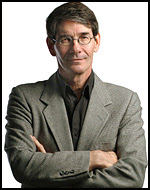
Each week, the National Book Critics Circle will post a list of five books a critic believes reviewers should have in their libraries. We recently heard from Pulitzer Prize winning critic, Michael Dirda. Here are the books he pointed out, with a short introduction to the craft of reviewing itself.
What does a good book reviewer need? Authority and intimacy. The first can only derive from extensive reading, largely in the great books of the past. How else can you judge what’s truly new if you don’t know what’s already been done? A reviewer of fiction needs to be familiar with more than the novels of the last 40 years; he or she should be acquainted with the sweep of narrative from Petronius and Murasaki Shikibu to Colette and Kafka; he or she should know both the Arthurian romances and Georgette Heyer’s regency romances. Confidence comes with knowledge.
An intimate tone is harder to achieve. The besetting fault of many reviewers is a cheap smartness, a desire to brag and show off, sometimes by being snarky and coarse, at other times by sounding superior and condescending, like a caricature of T.S. Eliot lecturing to graduate students. But in the long run reviewers succeed best when they start with love. If you care deeply for a book, author or subject, you will want others to understand and share your passion. If a book fails to live up to its promise or premise, you will point this out more with sorrow than with glee. The correction of taste does matter, yet sympathy, intelligent appreciation and genuine enthusiasm are even more important. That said, a review must also be entertaining, on some level, or nobody will bother to read it.
Or so I believe. The five books below have helped me better to understand what I do and to write, at least occasionally, with the seeming nonchalance, the sprezzatura, that I particularly admire.
Seven Types of Ambiguity, by William Empson. Empson shows you how to be a reader upon whom nothing is lost. No one has ever peered so deeply into poems, and yet his tone is gruff, manly and commonsensical: He assumes you’re as smart as he is.
Anatomy of Criticism, by Northrop Frye. Where Empson is microscopic, Frye is panoramic. Step back, he says, from that poem, novel or play and you will gradually perceive the pattern in the carpet. Frye’s capacious mind seems to embrace all of literature, myth and religion. Plus, he writes with a clarity that Thomas Aquinas might envy, without ever growing snooty about it.
Kipling, Auden & Co., by Randall Jarrell. Any of Jarrell’s collections display his deep love of literature, supported by his unerring judgment, slashing wit, brilliant phrase-making, and occasional corniness. But this posthumous collection focuses on Jarrell’s more fugitive pieces—the round-ups, brief notices, lists, casual features, acts of brief homage. These, not long essay-reviews, make up the bread and butter of most reviewers, and Jarrell shows how to make even the least bit of filler something personal, revealing and memorable.
.
The Evening Colonnade, by Cyril Connolly. This hefty collection of late Connolly pieces portrays that most epicurean of critics at his most wistful and retrospective. Blessed with a champagne-like prose (clear, delicious and intoxicating), Connolly here recalls the great writers he knew, the books he has collected, the places to which he has traveled. This is delicious, civilized literary entertainment, the table-talk of a connoisseur..
The works of Robert Phelps. All young reviewers need a model, an ideal, and Robert Phelps was mine. An authority on Auden, Colette and Cocteau, he compiled a scrapbook-almanac called The Literary Life, reviewed regularly for the old Herald-Tribune, and lived surrounded by the books he loved. He was also a man of immense generosity and kindness, passionate about literature, fond of Tanqueray martinis and gossip. Everything Robert wrote—even captions to illustrations or college course descriptions—sounded like Robert. What’s more, the man was beloved by virtually all who knew him, and these included some of the most interesting writers and literary figures of our time—James Salter, Richard Howard, Ned Rorem, Susan Sontag, Roger Straus. Some of Phelps’s letters (to Salter) have been recently edited for publication, but all of his literary journalism and much of his correspondence deserves to be collected and published. His was the finest literary sensibility I have ever known.
Michael Dirda, a weekly columnist for The Washington Post Book World, is the author of the memoir An Open Book and of several collections of essays: Readings, Bound to Please, Book by Book, and, Classics for Pleasure. He conducts an online book discussion each Wednesday at 2 PM for washingtonpost.com.

